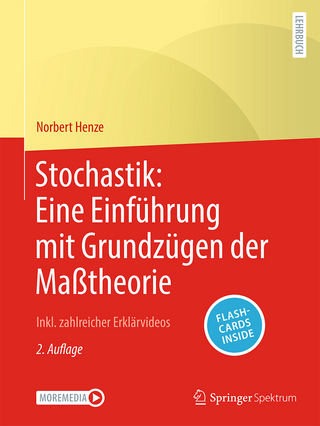
Limit Theorems for Multi-Indexed Sums of Random Variables
Springer Berlin (Verlag)
978-3-662-51150-3 (ISBN)
Presenting the first unified treatment of limit theorems for multiple sums of independent random variables, this volume fills an important gap in the field. Several new results are introduced, even in the classical setting, as well as some new approaches that are simpler than those already established in the literature. In particular, new proofs of the strong law of large numbers and the Hajek-Renyi inequality are detailed. Applications of the described theory include Gibbs fields, spin glasses, polymer models, image analysis and random shapes.
Limit theorems form the backbone of probability theory and statistical theory alike. The theory of multiple sums of random variables is a direct generalization of the classical study of limit theorems, whose importance and wide application in science is unquestionable. However, to date, the subject of multiple sums has only been treated in journals.
The results described in this book will be of interest to advanced undergraduates, graduate students and researchers who work on limit theorems in probability theory, the statistical analysis of random fields, as well as in the field of random sets or stochastic geometry. The central topic is also important for statistical theory, developing statistical inferences for random fields, and also has applications to the sciences, including physics and chemistry.
Oleg Klesov graduated from Kiev Shevchenko University in 1977 and obtained his PhD in 1979, followed by his habilitation in 2001. He is currently Professor at the National Technical University of Ukraine "Kyiv Polytechnic Institute". During his academic career, he has held several positions as Invited Professor at Lublin (Poland), Debrecen (Hungary), Marburg, Koeln, Paderborn (Germany), Gainesville (USA), Cergy Pontoise (France), and Lakehead (Canada). His main scientific interests are in probability theory, stochastic processes and real analysis.
1.Notation and auxiliary results.- 2.Maximal inequalities for multiple sums.- 3.Weak convergence of multiple sums.- 4.Weak law of large numbers for multiple sums.- 5.Almost sure convergence for multiple series.- 6.Boundedness of multiple series.- 7.Rate of convergence of multiple sums.- 8.Strong law of large numbers for independent non-identically distributed random variables.- 9.Strong law of large numbers for independent identically distributed random variables.- 10.Law of the iterated logarithm.- 11.Renewal theorem for random walks with multidimensional time.- 12.Existence of moments of the supremum of multiple sums and the strong law of large numbers.- 13.Complete convergence.
"The book is well written and mathematically rigorous. ... To date there is no book like the present one. All of the important results on multiple sums are scattered throughout the literature. ... In summary, this is a useful book for a researcher in probability theory and mathematical statistics. It is very carefully written and collects results which are not easy to find in the literature or which had been even forgotten." (Nikolai N. Leonenko, zbMATH 1318.60005, 2015)
| Erscheinungsdatum | 29.08.2016 |
|---|---|
| Reihe/Serie | Probability Theory and Stochastic Modelling |
| Zusatzinfo | XVIII, 483 p. 2 illus. |
| Verlagsort | Berlin |
| Sprache | englisch |
| Maße | 155 x 235 mm |
| Themenwelt | Mathematik / Informatik ► Mathematik ► Wahrscheinlichkeit / Kombinatorik |
| Naturwissenschaften ► Physik / Astronomie | |
| Schlagworte | 60F15, 60F05, 60F10, 60E15, 60E07, 60E10, 60F20 • almost sure convergence • law of the iterated logarithm • limit theorems of probability theory • Mathematical methods in physics • Mathematical Physics • mathematics and statistics • multiple sums • probability and statistics • Probability theory and stochastic processes • Statistical Theory and Methods • stochastics • strong law of large numbers |
| ISBN-10 | 3-662-51150-9 / 3662511509 |
| ISBN-13 | 978-3-662-51150-3 / 9783662511503 |
| Zustand | Neuware |
| Informationen gemäß Produktsicherheitsverordnung (GPSR) | |
| Haben Sie eine Frage zum Produkt? |
aus dem Bereich


